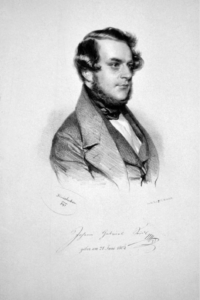Men are naughty
(Poet's title: Die Männer sind mechant)
Set by Schubert:
D 866/3
[probably summer 1828]
Part of Vier Refrain Lieder, D 866
Du sagtest mir es, Mutter:
Er ist ein Springinsfeld!
Ich würd es dir nicht glauben,
Bis ich mich krank gequält!
Ja, ja, nun ist er’s wirklich;
Ich hatt’ ihn nur verkannt!
Du sagtest mir’s, o Mutter:
»Die Männer sind mechant!«
Vorm Dorf, im Busch, als gestern
Die stille Dämm’rung sank,
Da rauscht’ es: »Guten Abend!«
Da rauscht’ es: »Schönen Dank!«
Ich schlich hinzu, ich horchte;
Ich stand wie festgebannt:
Er war’s, mit einer andern:
»Die Männer sind mechant!«
O Mutter, welche Qualen!
Es muss heraus, es muss!
Es blieb nicht bloß beim Rauschen,
Es blieb nicht bloß beim Gruß.
Vom Gruße kam’s zum Kusse;
Vom Kuss zum Druck der Hand;
Vom Druck, ach, liebe Mutter!
»Die Männer sind mechant!«
You told me, mother:
He is out of control!
I did not want to believe you,
So much so that I eventually tormented myself with illness!
Yes, yes, he really is out of control now,
I have come to understand him for what he is.
You told me, mother:
“Men are naughty!”
In front of the village, in the bushes, yesterday as
The quiet twilight was falling,
There was a noise: “Good evening!”
There was a noise: “Many thanks!”
I slipped behind the bush, I eavesdropped;
I stood as if bound up tightly:
It was him, with someone else
“Men are naughty!”
Oh mother, what agonies!
It has to come out, it has to!
It did not just stop with the noises,
It did not just stop with the greeting!
From a greeting it went on to kissing,
From kissing to pressing the hand,
From pressing, oh mother dear!
“Men are naughty!”
All translations into English that appear on this website, unless otherwise stated, are by Malcolm Wren. You are free to use them on condition that you acknowledge Malcolm Wren as the translator and schubertsong.uk as the source. Unless otherwise stated, the comments and essays that appear after the texts and translations are by Malcolm Wren and are © Copyright.
☙
Themes and images in this text:
Bushes and undergrowth Evening and the setting sun Hands Kissing Mother and child
‘Mechant’ is not a German word (or at least it has no entry in the Grimms’ Dictionary). There is a French word ‘méchant’ (naughty), but the plural form would be ‘méchants’ and it would not rhyme with ‘verkannt’, ‘festgebannt’ or ‘Hand’. We therefore have to conclude the ‘mechant’ is an invented epithet designed to have a whiff of French sauciness (Oh, là là!). It serves to signal that the speaker is probably not as shocked or as shockable as she wants to appear.
There is a character in Dodie Smith’s I Capture the Castle who is criticised for being ‘consciously naïve’ and that is surely an accurate description of this girl. What was she doing hiding in the bushes if she was as innocent of the ways of men as she claims? It is hardly surprising that the lad turned elsewhere. What IS surprising is that anyone has ever found this text in any way funny.
☙
Original Spelling Die Männer sind mechant Du sagtest mir es, Mutter: Er ist ein Springinsfeld! Ich würd' es dir nicht glauben, Bis ich mich krank gequält! Ja, ja, nun ist er's wirklich; Ich hatt' ihn nur verkannt! Du sagtest mir's, o Mutter: »Die Männer sind mechant!« Vor'm Dorf im Busch, als gestern Die stille Dämm'rung sank, Da rauscht' es: »Guten Abend!« Da rauscht' es: »Schönen Dank!« Ich schlich hinzu, ich horchte; Ich stand wie festgebannt: Er war's, mit einer Andern »Die Männer sind mechant!« O Mutter, welche Qualen! Es muß heraus, es muß! Es blieb nicht bloß beim Rauschen, Es blieb nicht bloß beim Gruß! Vom Gruße kam's zum Kusse, Vom Kuß zum Druck der Hand, Vom Druck, ach liebe Mutter! »Die Männer sind mechant!«
Note: Schubert received Seidl’s poem in handwritten form. Seidl did not include it in his poetry editions.


